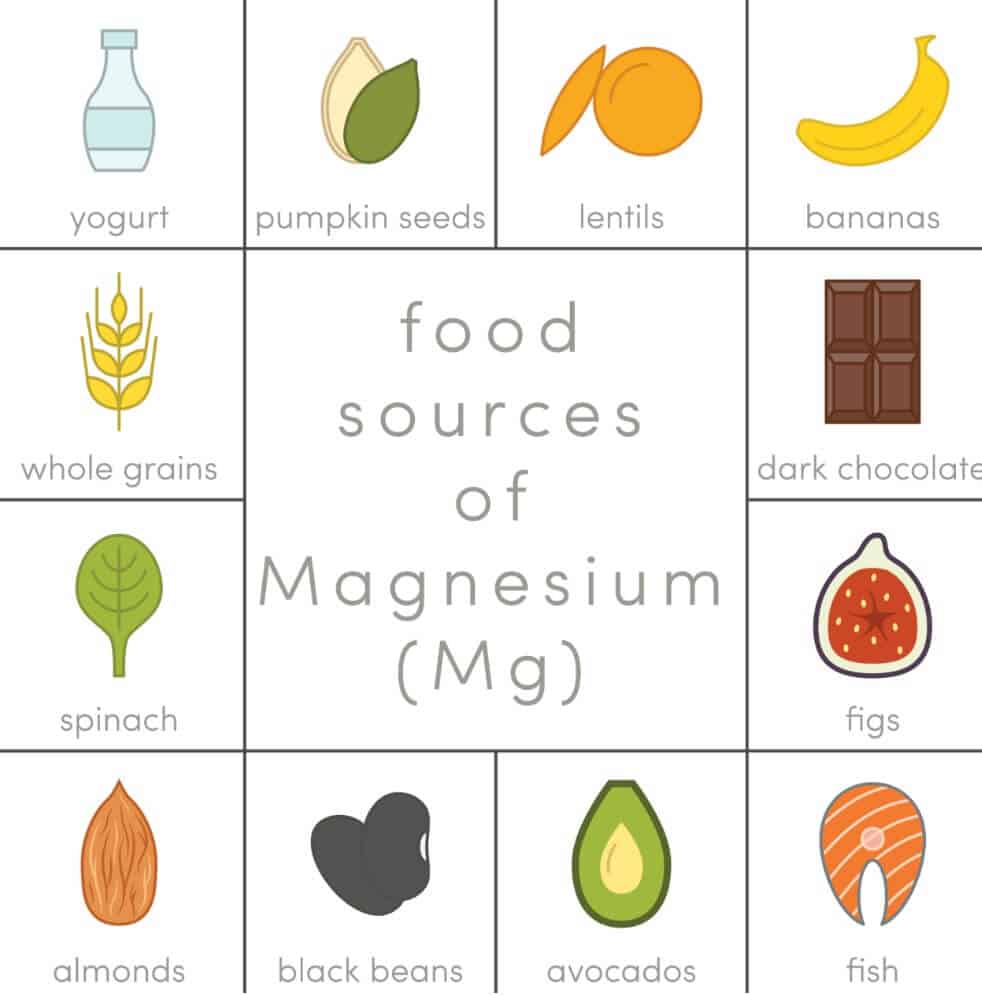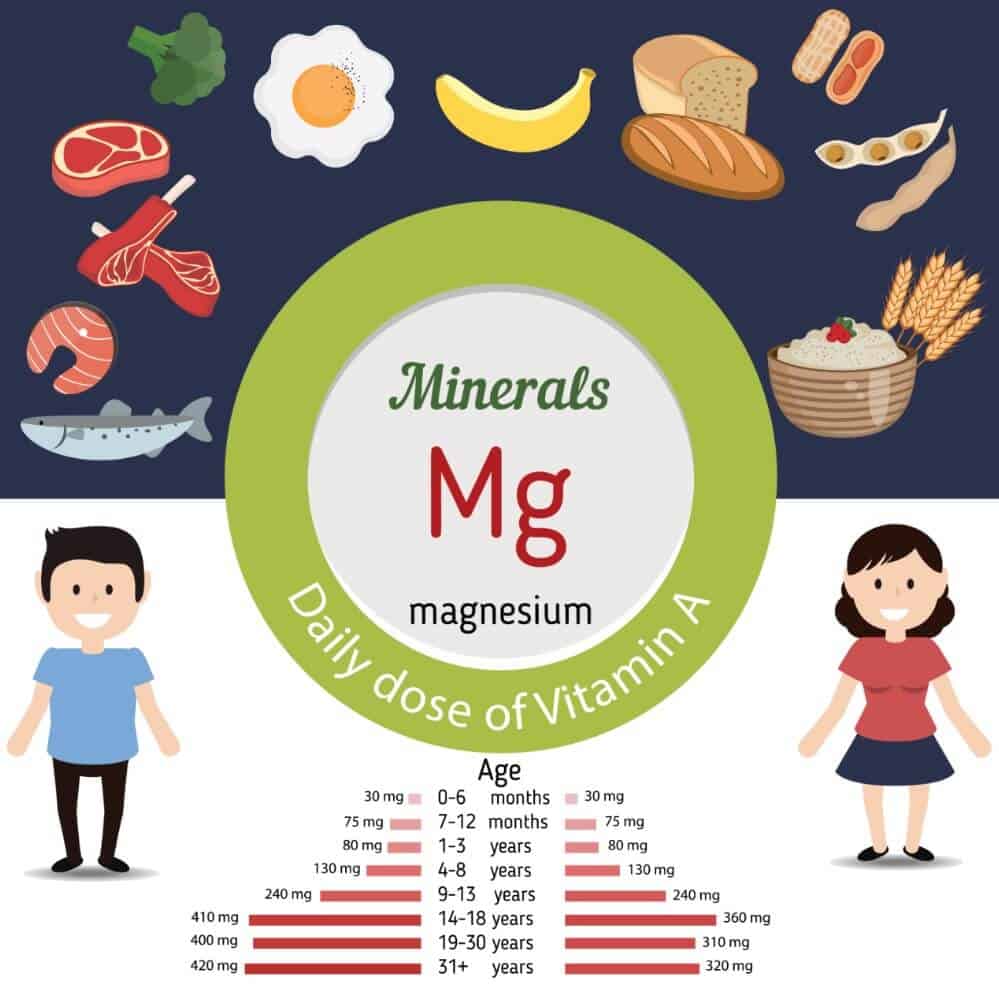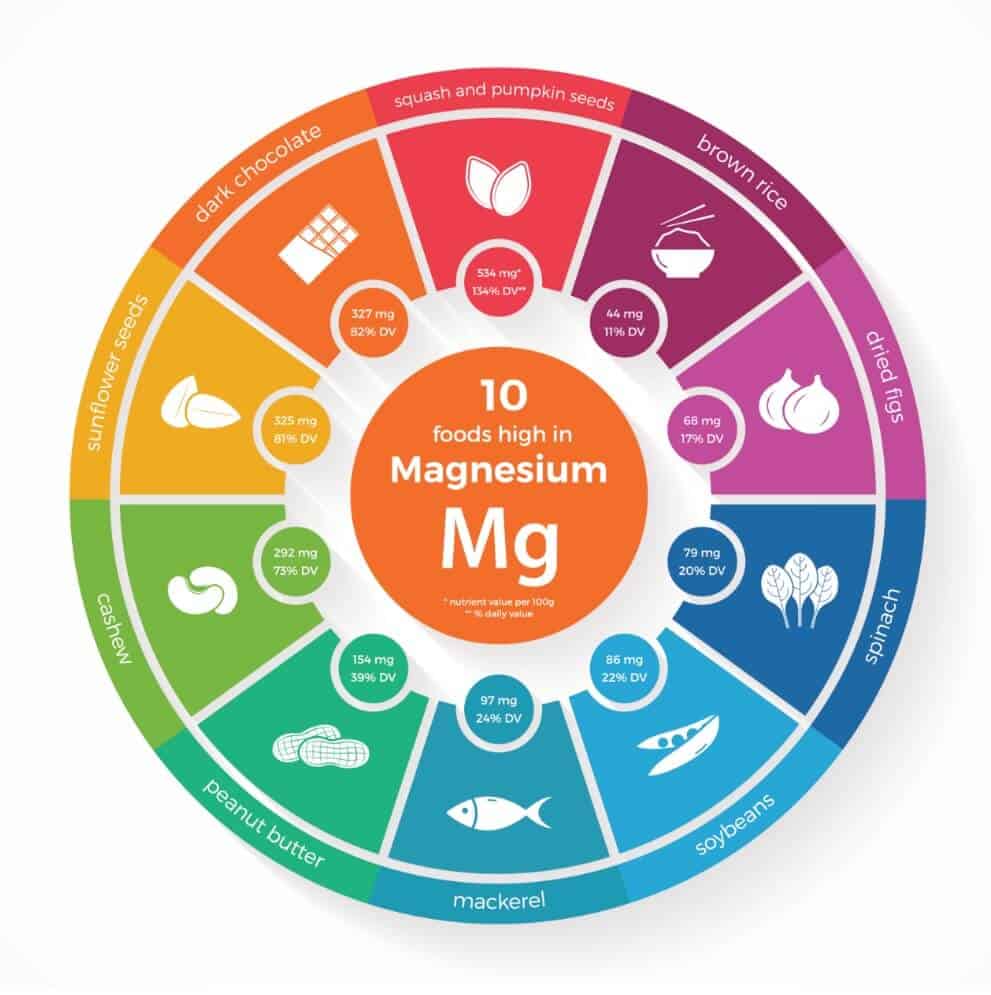If there’s a mineral vital to bodily function, you’d want to include it in your diet, right? Magnesium benefits the heart, kidneys and lungs. Additional benefits of magnesium include weight management and digestive health.
Before choosing the right magnesium supplement, you first need to understand the benefits to health.
We’ll take a closer look at what is magnesium, what is magnesium used for, how much magnesium should i take, symptoms of magnesium deficiency and food sources of magnesium.
What is Magnesium?
Magnesium is an essential mineral. There are multiple magnesium sources, including everyday foods. There are magnesium supplements helping to improve muscle and nerve function. Additional magnesium health benefits include bone health.
Magnesium also plays an essential role in more than 300 enzymatic reactions in the body. It helps metabolize proteins and other foods.
What is magnesium good for? It’s used to treat symptoms of:
- Chronic fatigue
- Constipation
- Indigestion
- Magnesium deficiency
There are different magnesium sources:
Magnesium Chealate
Magnesium Chealate is an essential mineral and helps with the muscular and nervous system.
Magnesium Malate
Magnesium Malate is a combo of malic acid and magnesium. It’s used for energy support.
Magnesium Chloride
Magnesium Chloride is a magnesium powder promoting heart health and bone health.
Magnesium Citrate
Magnesium Citrate is citric acid, but in salt form. It’s a saline laxative and typically used prior to select surgeries.
Bottom Line: Magnesium is an essential mineral promoting overall health and wellness.
Sources of Magnesium

There are several sources of magnesium. What food has magnesium?:
- Spinach
- Bananas
- Almonds
- Pumpkin Seeds
- Dark Chocolate
- Figs
- Avocado
- Yogurt
- Black Beans
- Broccoli
- Kefir
- Squash Seeds
- Mackerel
- Lentils
- Soybeans
- Brown Rice
No matter the foods with magnesium, you have options to improve overall health and wellness.
Bottom Line: Although you can take magnesium supplements, you can also improve health by eating foods with magnesium.
How Much Magnesium Do You Need?

The amount of magnesium you need may vary depending on your age, gender, weight and overall health. However, if you have low magnesium levels or a magnesium deficiency, your doctor may increase the magnesium dosage.
In general, the recommended magnesium dosage is 400 mg for adult males ages 19-30. Women in the same age group need a magnesium dosage of 310 mg per day. For men older than 30, their magnesium dosage is 420mg per day. However, women older than 30 should increase their magnesium dosage to 320mg day.
If you are taking magnesium for constipation or using a supplement such as Mag O7, it typically comes in the form of magnesium citrate liquid. The magnesium dosage is 10-30 g has been shown to be effective.
Magnesium citrate liquid also helps with indigestion. The approximate magnesium dosage is 400-1,200 mg.
Bottom Line: Typically the magnesium dosage for adults is 310-420 mg per day. However, your doctor could increase the dosage.
Magnesium Deficiency Symptoms

One of the signs of magnesium deficiency is low magnesium levels. It also occurs if you don’t eat foods that have magnesium.
Signs of magnesium deficiency include:
- Confusion
- Dizziness
- Weakness
- Difficulty swallowing
- Muscle cramps
- Nausea
- Fatigue
- Respiratory issues
- Calcium deficiency
- Potassium deficiency
- Poor heart health
However, some people do experience severe magnesium deficiency or hypomagnesemia. This could indicate serious concerns with liver, kidney and heart function.
Bottom Line: There are several signs of magnesium deficiency. It’s important to look at the amount of magnesium in food to avoid low magnesium levels.
Magnesium Benefits and What Does Magnesium Do?

What does magnesium do? It helps relax blood vessels.
What does magnesium do for the body? The mineral helps with more than 300 body functions. Therefore, it’s essential for overall wellness.
The recommended magnesium dosage is about 150 to 250.
Is Magnesium Citrate a Laxative?

A magnesium supplement connected causing laxative effects is magnesium citrate. While it’s available as magnesium pills, it’s also available as liquid magnesium.
What are magnesium citrate benefits? It helps treat digestive issues and constipation. It also promotes bowel movement.
Magnesium stimulates the bowels, causing muscle contractions, which help with regularity.
Bottom Line: Magnesium supplements help improve regularity and treat constipation.
Magnesium Supplements and Weight Loss

There are benefits of magnesium supplements. But, can taking magnesium help you lose weight?
Studies from the Journal of Nutrition reveals magnesium benefits wellness by balancing blood glucose and insulin levels in obese or overweight individuals.
According to LiveStrong, research shows that following a low-calorie diet and eating magnesium food sources, helps with weight loss. rich in foods that contain high levels of magnesium can aid with weight reduction. More benefits of magnesium include increased free testosterone production.
Bottom Line: Although taking magnesium doesn’t help with fat loss, there’s research showing it helps with weight loss.
Magnesium Benefits to Health

Increasing magnesium dosage helps improve your memory.
Bottom Line: Magnesium benefits overall health and wellness.
What are Magnesium Side Effects?
Research highlights magnesium health benefits, but also mentions side effects. These often occur if too much is ingested.
Typical side effects could include:
- Diarrhea
- Nausea
- Upset Stomach
- Vomiting
- Abdominal Cramps
- Bloating
- Electrolyte Imbalance
Magnesium citrate may not be safe if taken in conjunction with prescription medications.
Bottom Line: While there are some mild side effects that can occur, it’s a rarity to see negative side effects from magnesium.
What Users Are Saying
“Got this for restless legs. It definitely seems to help. I’m sleeping more deeply.”
“I supposed supplements do not work for everyone. This has done nothing for me, so I will not be purchasing again. However, it may work for you. I am just sharing my own experience with this product.”
“I have been magnesium deficient before and had very bad headaches from it! They caught this when I was in the hospital before I got my PEG tube put in and man let me tell you, the magnesium through the IV BURNED SO BAD but I caught it immediately and told them to just dilute it as much as they could. that helped with the burning thankfully!”

The Bottom Line on Magnesium Benefits
Overall, magnesium benefits hundreds of bodily functions. Adding a magnesium supplement helps add to magnesium in food.
While there’s limited research showing it helps you lose weight, there are studies showing it helps improve overall health and wellness. If you have low magnesium levels or a magnesium deficiency, talk to your doctor to see if a magnesium supplement is right for you.
As for weight-loss, a comprehensive program that’s backed by clinical research may work best.
Noom is one of the best weight-loss apps we have ever seen. The program offers its users plenty of interactive tools and community features to help “trick” themselves into making healthier choices while losing weight.
Right now, all readers can get a free trial offer of Noom.
Magnesium Supplements, Deficiency and Magnesium Benefits to Health Questions & Answers
Taking magnesium every day may be beneficial, as magnesium is an essential mineral involved in hundreds of biochemical reactions in the body. Magnesium helps with many functions, such as maintaining healthy muscles and bones, regulating blood sugar levels, reducing stress levels and improving sleep quality. It can also help prevent certain conditions, including migraines and heart disease. Talk to your healthcare provider before taking any supplements to determine the right dose for you.
Article Sources
- http://www.webmd.com/diet/supplement-guide-magnesium#1
- https://www.ncbi.nlm.nih.gov/pmc/articles/PMC4455825/
- http://www.webmd.com/vitamins-supplements/ingredientmono-998-magnesium.aspx?activeingredientid=998
- https://www.ncbi.nlm.nih.gov/pmc/articles/PMC4586582/
- https://pubchem.ncbi.nlm.nih.gov/compound/magnesium#section=Top
- http://www.livescience.com/28862-magnesium.html
- http://www.livestrong.com/article/441042-how-does-magnesium-work-as-a-laxative/
- http://www.livescience.com/28862-magnesium.html
- http://www.livestrong.com/article/483385-types-of-magnesium/
- https://www.ncbi.nlm.nih.gov/pubmed/25540137
- http://www.livestrong.com/article/22672-foods-contain-magnesium/
- http://www.webmd.com/vitamins-supplements/ingredientmono-998-magnesium.aspx?activeingredientid=998
- http://www.mayoclinic.org/drugs-supplements/magnesium-supplement-oral-route-parenteral-route/proper-use/drg-20070730
- https://www.drugs.com/magnesium.html
- http://www.livestrong.com/article/499988-the-recommended-dose-of-magnesium/
- http://www.webmd.com/vitamins-supplements/ingredientmono-998-magnesium.aspx?activeingredientid=998
- http://www.webmd.com/vitamins-supplements/ingredientmono-998-magnesium.aspx?activeingredientid=998
- http://www.webmd.com/diet/supplement-guide-magnesium#1
- http://www.webmd.com/vitamins-supplements/ingredientmono-998-magnesium.aspx?activeingredientid=998
- http://lpi.oregonstate.edu/mic/minerals/magnesium
- http://www.webmd.com/vitamins-supplements/ingredientmono-998-magnesium.aspx?activeingredientid=998
- http://www.webmd.com/vitamins-supplements/ingredientmono-998-magnesium.aspx?activeingredientid=998
- http://lpi.oregonstate.edu/mic/minerals/magnesium
- http://www.livestrong.com/article/458283-the-magnesium-dosage-for-high-blood-pressure/
- https://ods.od.nih.gov/factsheets/Magnesium-HealthProfessional/
- http://www.livestrong.com/article/441042-how-does-magnesium-work-as-a-laxative/
- http://www.webmd.com/vitamins-supplements/ingredientmono-998-magnesium.aspx?activeingredientid=998
- http://www.livestrong.com/article/523282-the-benefits-of-magnesium-citrate-supplements/
- http://www.webmd.com/drugs/2/drug-522-2202/magnesium-citrate-oral/magnesium-citrate—oral/details
- http://www.livestrong.com/article/441042-how-does-magnesium-work-as-a-laxative/
- http://www.healthline.com/health/food-nutrition/magnesium-for-weight-loss
- http://www.livestrong.com/article/486061-does-magnesium-help-you-lose-weight/
- http://www.webmd.com/brain/news/20100127/magnesium-may-improve-memory
- http://www.livestrong.com/article/285325-side-effects-of-magnesium-pills/
- http://www.webmd.com/vitamins-supplements/ingredientmono-998-magnesium.aspx?activeingredientid=998
- http://www.livestrong.com/article/285325-side-effects-of-magnesium-pills/
- http://www.medicinenet.com/magnesium_citrate-oral/article.htm
- https://www.amazon.com/gp/customer-reviews/RU2BBIO4FNA9/
- https://www.amazon.com/gp/customer-reviews/R78XIMRY22C6M/
- https://pulmonaryhypertensionnews.com/forums/forums/topic/magnesium-deficiency/#post-16436
- https://noom.8utb.net/c/1720052/500038/8591
- https://noom.8utb.net/c/1720052/500038/8591


